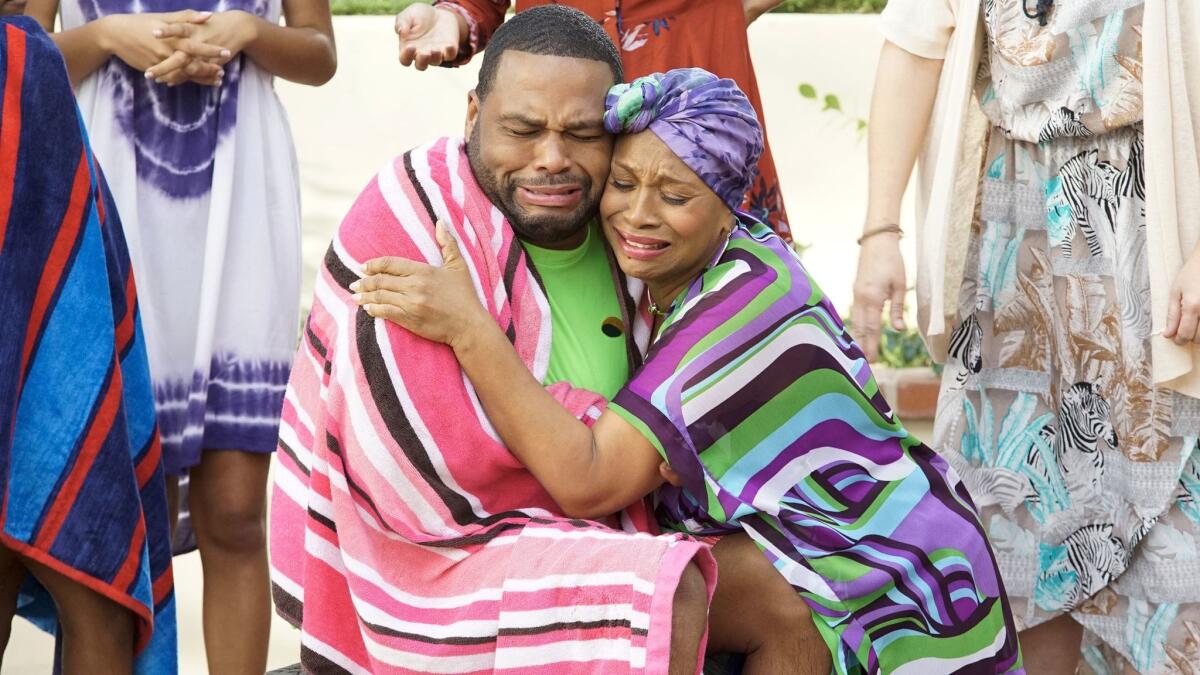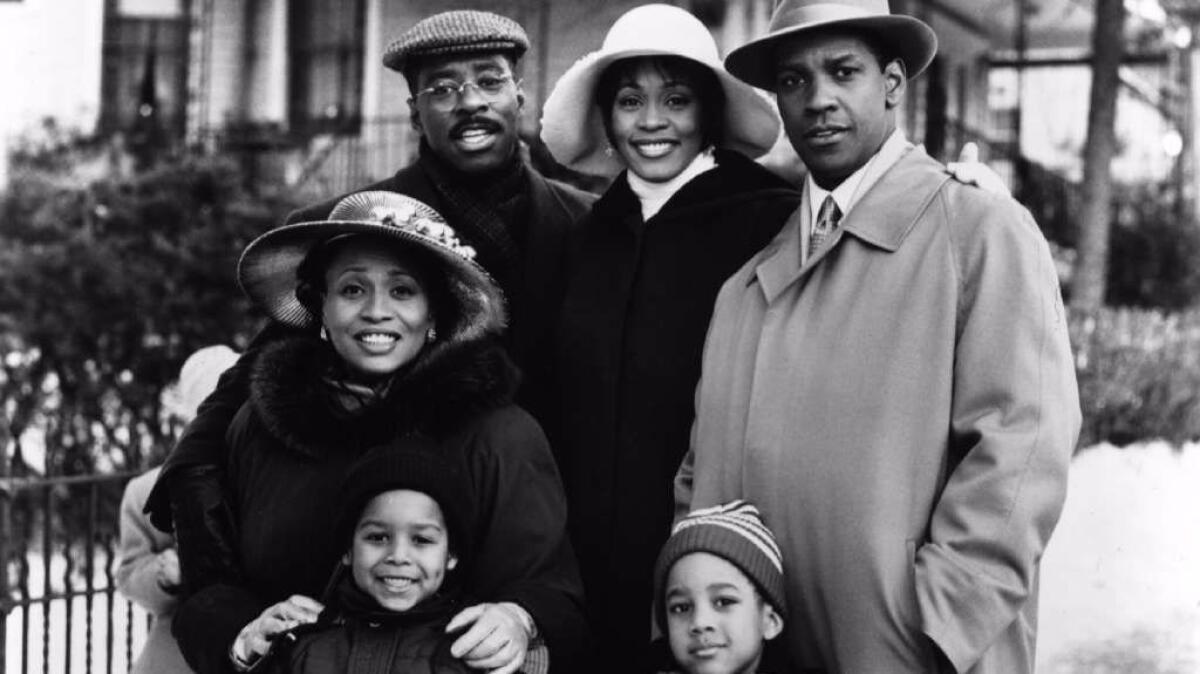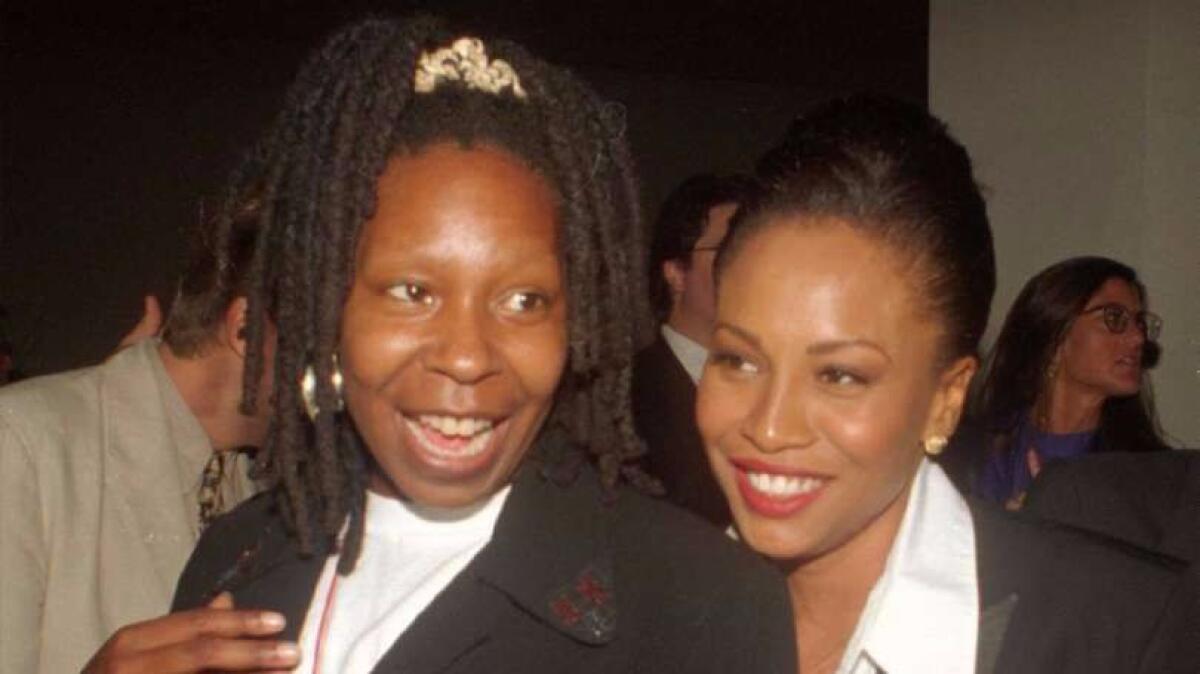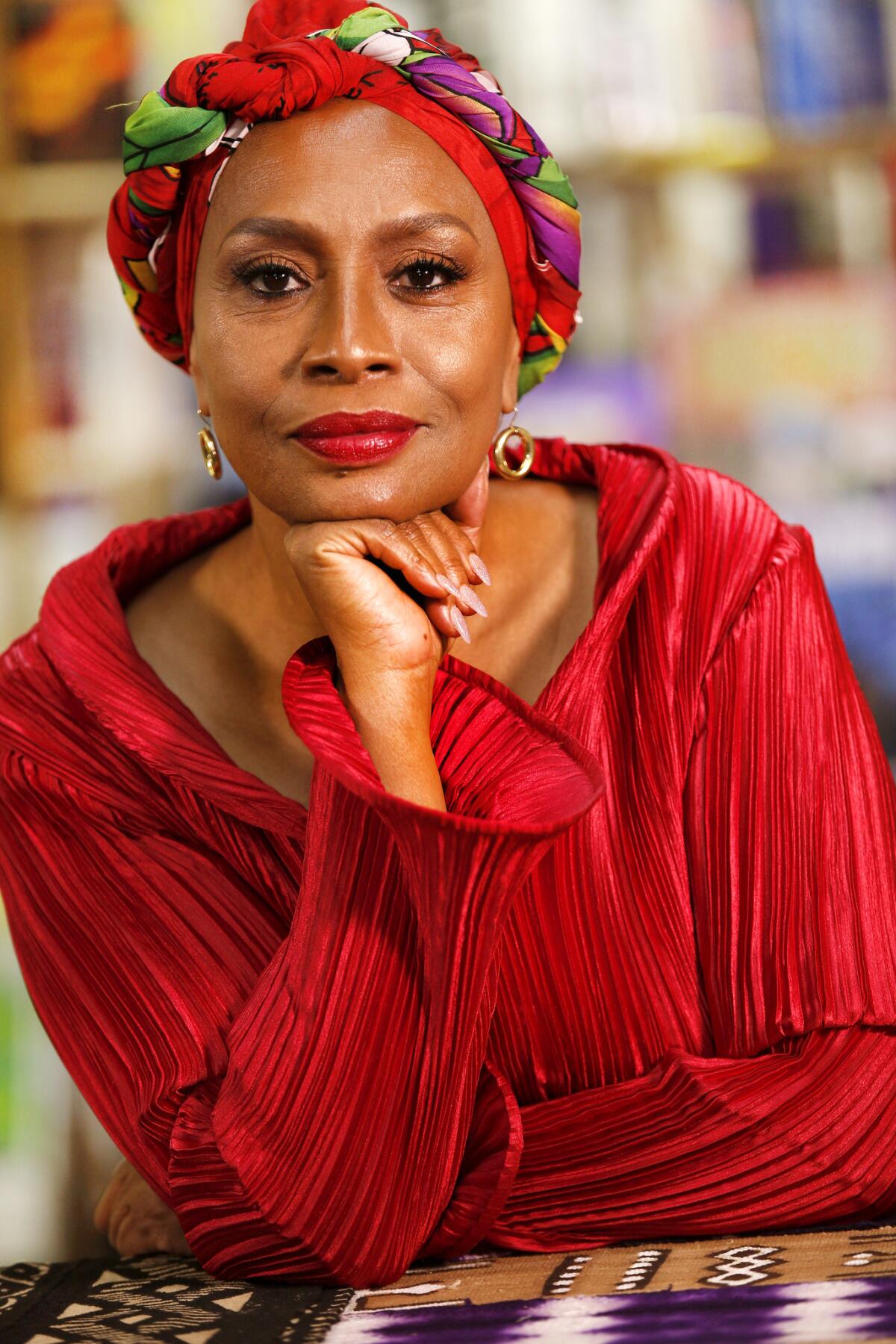Q&A: Jenifer Lewis is literally ‘The Mother of Black Hollywood’

Author-actress Jenifer Lewis signing her new memoir at Eso Won Books in Leimert Park.
- Share via
Jenifer Lewis is a griot, carrying the tales of a resilient people who’ve been to hell and back on her shoulders. It’s what gives her the ability, the audacity, to enter every room as if she owns it.
“When you come through that fire, you don’t [mess] around,” the “Black-ish” actress said of her life.
That’s the same approach she’s taken in writing her first memoir, “The Mother of Black Hollywood,” available in bookstores now. In it, she details, quite unapologetically, the infernos she's walked through — poverty, molestation, an abortion — and the triumphs she’s had — “362 episodic television shows, 68 movies, four Broadway shows, and I’ve toured in concert all over the world,” she said in an interview with The Times. And though she could’ve written a book long ago, she admits, only in the last couple of years did she find the inspiration.
“After the millennials laid down in front of the police barricades, I said, ‘All right, I’ll give them my story,’ because my book is basically telling them to just feel the fear and do it anyway,” said Lewis, 60, referencing the rise of the Black Lives Matter movement. “You’ve got to feel it. You’ve got to feel disappointment. You’ve got to feel mad and hopeful and resist the forces that would take the air to breathe from your great-grandchildren.
I’ve had my day in the sun and now I am the sun. This little light of mine, I’m going to let it shine.
— Jenifer Lewis
“We didn’t think you guys would have to fight as hard as we did, but now you’re going to have to fight even more and harder because, oh, the times are changing.”
Lewis was born into poverty near St. Louis in the small town of Kinloch. In reflection, she remembers everyone looking like her: the librarian, the police officers, the firefighters, the mayor, the superintendent of schools were all black. And they all supported her from an early age; her church congregation’s roaring response to her solo at age 5 would be the catalyst to a life on stage and screen.
Decades later, she has mastered stages and screens large and small and quite literally has played the mother of nearly every up-and-coming black actor and actress of the last 30 years.
Ahead of three book signings in Los Angeles on Dec. 9, 10 and 16, Lewis spoke with The Times in her Sherman Oaks home about her memoir, going to therapy, the effect of the AIDS epidemic on the black creative community and what it feels like to still be a working, and recognizable, actress well after 40.

You write about a number of the more unsavory parts of your life. Did you know you wanted to open up that much at the start?
I knew I could do no less. I’m raw. I’m Earth. I lay it on the slab. Ain't no shame in my game. I didn't have any trouble doing so because we all go through the feelings, but I got to come out on the top. And when you’re on top is when you can reach back. That’s why I always say, “Wherever you are is where the [heck] you are and you can’t be in the moment where you are not. Honor this moment.” I’ve never had any trouble telling the whole truth and nothing but the truth. It worked for me and it worked against me, but as we can see, mostly for me.
I’ve got about 30 more summers left. You don’t [mess] around after 60, and there’s 10,000 stories that didn't make the book, so the second is on the way.
Talk to me about your early years in therapy and how accepting that you were bipolar affected your life.
Honey, I was in there performing, carrying on, instead of trying to get at that pain. You run from it. And it’s two steps forward, one step back, 30 steps forward, one step back. It’s life.
I began to look at the warning signs: Am I speeding in a car? Am I speed talking? Am I speed walking? — although Arthur and Ritis Jackson [she touches her left and right knees] don’t let me speed around the way I used to.
It took me five years to get on the medication and then I got off and then there was a dark night of the soul when I was filming “The Temptations.” After that, it’s been maintaining. It’s a constant walk, but I walk that walk and talk that talk. I know who I am. It’s not a perfect life, but damn does it feel good to just know who you are.
How did you come to the tile, “The Mother of Black Hollywood?”
Well, what else could it be? Tupac, Whitney [Houston], [Angela Bassett as] Tina Turner, Gabrielle Union, Morris Chestnut, Kevin Hart. I’ve played [the mothers of] them all and had a good time doing it. I’m glad I became the mother of black Hollywood, because, as you can see, you can continue as Grandma and on and on. I’m one of the few women over 40 for that matter in showbiz at the top of their game. But that’s because I love what I do and my talent was a gift that I’ve tried to honor.

Which of those roles stick with you the most?
My favorite was “What’s Love Got to Do With It” [playing Tina Turner’s mother, Zelma Bullock ].
You write that prior to “black-ish,” it was primarily black folk who recognized you on the street, but the sitcom has garnered you new fans.
It’s a whole ’nother story. I used to be able to drop my head [to avoid people], but now white children come up to me. [laughs] They’re everywhere.
How does it feel to be recognized for both earlier roles in your career and something so current, and to still be working?
“black-ish” is the cherry on the top of my career… When you come into your own, when you’re in your skin, you’re unstoppable, because you’re living in the moment of life. And that is the goal, to be present, right here, right now and be smart enough to take care of business with some kind of love and passion accompanying that. So, it feels great to be working.
I think I’ve sustained, because I was just that [freaking] good. I never thought about 100%. I’m a 2,000 percenter... You will never hear “Welcome Jenifer Lewis” and never not be entertained.

You’re very supportive of work around AIDS and HIV research. One of the parts of the book that stuck with me is the devastation you and the arts community experienced at the height of the epidemic.
We lost the designers, the musicians, the artists. They dropped like flies. It was a silent war that was never declared. At that time, I was doing one-woman shows and I sang “I Heard It Through the Grapevine” as a ballad. All those gay boys wanted me to sing that at their funerals, and Stevie Wonder’s “They Won't Go When I Go.” I must’ve sung at at least 30 funerals… back to back to back to back. We were too young to experience that kind of death. It was too much. America, we’ve got a lot of blood on our hands for not taking care of its people.
You’ve become an internet fave with these viral videos of you, Brandy and Roz Ryan. How does that feel?
I have a platform now. Forty-five million people hit that button for “In These Streets.” When you find out you have that kind of popularity, you better use it. It’s called responsibility. And don’t think I won’t march 50 million people to tear down that wall [President Trump wants to build.]
There is a letter to the reader at the end of the book where you say you wrote it because you “owe.” What do you mean by that?
When you get as much as I have, you might want to give back. I’ve had my day in the sun and now I am the sun. This little light of mine, I’m going to let it shine. What else is there to do?

What do you hope people take away from knowing all that you reveal in the book?
A tornado is coming. A hurricane is coming. An earthquake is coming. A tsunami is coming. It’s called life. Be ye ready, because it’s coming. Since you know it’s coming, walk in it. You can’t run from it. Horrible things will happen in our lives — someone is murdered, somebody dies, someone suffers. These are traumatic things and they feel like forces of nature, but one thing about all of them is they pass. Everything is temporary, so live it.
And don’t think you’re going to get somewhere and be happy. Try really hard to be happy on your way to happy. I used to be so analytical trying to get everything right and perfect. Just live. This [life] is short, honey, so short. So, grab it by the ass and keep it moving.
Get your life! Follow me on Twitter (@TrevellAnderson) or email me: trevell.anderson@latimes.com.
Only good movies
Get the Indie Focus newsletter, Mark Olsen's weekly guide to the world of cinema.
You may occasionally receive promotional content from the Los Angeles Times.








